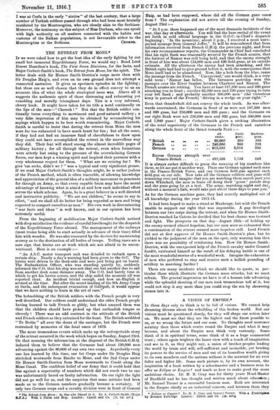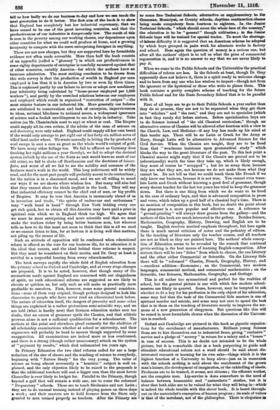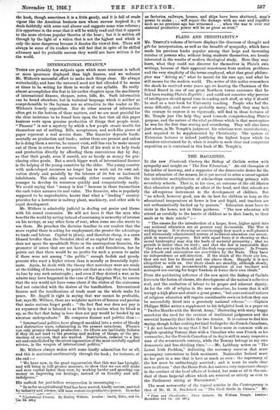A VISION OF EMPIRE.* IN these days only to think
is to be full of visions. We cannot help dreaming dreams about the rebuilding of this broken world. But our visions must be questioned closely, for they will shape our action later on. We must see that they arc the highest and tho finest possible to us, or we wrong the future and our sons. No thoughts need narrower scrutiny than those which centre round the Empire and what it may become, and about the Empire men think very variously. Some think of it in spiritual terms, some think of it as a huge commercial trust ; others again brighten the baser view with a touch of imagination and see in it, as they might say, a union of brother-peoples leading the world by brain and will, self-sufficient and invincible, yet bending its powers to the service of men and out of its boundless wealth giving to its own members and the nations without it the material for an ever fuller and higher life. Some such picture le, by its own account, the inspiration of a book written by a schoolmaster and a business man to offer us Eclipse or Empire, and teach us how to make good the more ambitious choice. Dr. H. B. Gray was for thirty years Head-Master of Bradfield and he has thought and written much about education ; Mr. Samuel Turner is a successful business man. Both are interested in the Empire chiefly as an industrial concern, and between them they
• Eclipse or Empire! By- H. B. Grey and Pronuel Turner. With a FronUssams by Bernard rartMge. London ; Shbct and Co. L. net,1
tell us how badly we do our business to-day and how we can teach the neat generation to do it better. The first aim of the book is to show that England has completely lost her industrial supremacy, that we have oeased to be one of the great inventing countries, and that the productiveness of our industries is dangerously low. The result of this Is seen in the poverty among our working classes, our dependence upon other countries for what we could well produce at home, and a growing incapacity to compete with the more enterprising foreigner in anything.
These are not new charges, but they are supported here by formidable evidence not often made accessible. More than half the book consists of an appendix (called a "glossary ") in which our productiveness in some eighty departments of enterprise is carefully measured against that of other countries, notably America—for which the authors have an immense admiration. The most striking conclusion to be drawn from this wide survey is that the production of wealth in England per man employed is less than it is in America by two or even by three times. This is explained partly by our failure to invent or adopt new machinery (our inferiority being calculated by "horse-power employed per 1,000 workers "), and partly by the wretched relations between our employers and employed which result in organized "restriction of output "—the most sinister feature in. our industrial life. More generally our failures are attributed to conservatism and. lack of enterprise, imperviousness to ideas, national blindness to national issues, a widespread ignorance of science and a foolish unwillingness to use its help in industry. Take cotton (as Mr. Chamberlain used to say) or wheat or coal. The Empire could supply all its own cotton, if the advice of the man of wieners on soil-doctoring were only asked. England could supply all her.own bread if she would only arrange to put eight out of her forty-six million acres of tilled land under wheat. We waste annually in letting the by-products of coal escape in soot a sum as great as the' whole world'is output of gold. We have many other failings too. We fail to afforest as Germany does (making her eight millions- a year thereby), we fail to adopt the decimal system (which by the use of the florin as unit would- leaveus most of our old coins), we fail to shake off Benthamism and the doctrines of laissez- fairs, and worst of all we fail to see the nobility and romance of the business man's work in the world. This long indictment will be widely read, and for the most part people will probably assent to its contentions ; for the nation is in a chastened mood, and we are all willing to mend our ways if we are shown where wisdom live But many will also feel that they cannot share the ideals implicit in the book. They will my that industrial efficiency cannot be the chief end of men, or big profits of Empires. It may be true that America is enormously ahead of us in invention and trade, "the spirits of endeavour and enthusiasm" may "walk hand in hand" through New York bidding every one get rich quick, but to obtain all this America may have paid a price in spiritual coin which we in England think too high. We agree that we must be more enterprising and more scientific and that we must snake the workers richer by being better business men, but whoever tells us how to do this must not seem to think that this is all we need or we cannot listen to him, for at bottom it is living well that matters, not piling up the means of life.
Such an attitude of opposition will be confirmed when. educational reform is offered as the cure for our business ills, for in education it is the ideal that counts, and the ideal behind these reforms is suspect. But they must be considered on their merits, and Dr. Gray at least is entitled to a respectful hearing from every educaticosaliet.
The book surveys rapidly the whole field of English education from the primary school to Oxford and Cambridge, and at every stage changes are proposed. It is to be noted, however, that though many of the accusations made against England are concerned with our sluggishness of spirit, no such educational reforms are suggested as are likely to elevate or quicken us, but only such as will make us practically more profitable to ourselves. First, however, come some general considera- tions—none of them very original, though perhaps designed to look like discoveries to people who have never read an educational book before. The nature of education itself, the dangers of precocity and some other things are explained in a rather pretentious semi-scientific way, and we are told (what is hardly new) that German education makes men too docile, that an excess of grammar spoils the Classics, and that athletic prowess alone is not a sufficient qualification for a schoolmaster. The authors at this point and elsewhere plead earnestly for the abolition of all scholarship examinations whether at school or university, and their arguments will probably be hard to answer though supported by some exaggeration. All examinations are indeed more or less condemned, and there is a strong (though rather unnecessary) attack on the system of "payment by results," which died unlamented ten years ago.
In Primary Education the two chief reforms called for are a large reduction of the size of classes and the teaching of science to everybody, beginning with "Nature Study" for the very young. The value of science as being almost necessarily a " heuristic " subject is well ex- plained, and the only objection likely to be raised to the proposals is that the additional teachers will cost a bigger sum than the most heroic Chancellor is ever likely to budget for. Parallel to the Primary, though beyond a gulf that will remain a wide one, are to come the reformed " Preparatory " schools. Thew are to teach Mechanics and not Latin ; they are to do manual training instead of playing games on three days a week ; and their masters are to hold licences from the State only granted to men trained properly as teachers. After the Primary are to come free Technical Schools, alternative or supplementary to the Grammar, Municipal, or County schools, daytime continuation-classes being made compulsory from fourteen to eighteen. In the Junior Technical Schools, "which should cover the whole face of the country." the education is to be " general " though utilitarian ; in the Senior Schools boys will be trained for special trades. To meet the shortage- of-labour difficulty it is suggested that an American scheme be adopted by which boys grouped in pairs work for alternate weeks in factory and school. Here again the question of money is a serious one, but after all the authors' object is to tell us what the price of commercial regeneration is, and it is no answer to say that we are never likely to Pay it.
Whenwe come to the Public Schools and the Universities the practical difficulties of reform are less. In the Schools at least, though Dr. Gray apparently does not believe it, there is a spirit ready to welcome change and to learn from any one who has wisdom to impart—though not from the ignorant or the hysterical or those who write to please them. This book contains a pretty complete scheme of teaching for the future Public School and for the State Secondary School that is to be parallel with it.
First of all bays are to go to their Public Schools a year. earlier than they do at present, they are not to be separated when they get there into " scholars " and "the rest," and they are not to specialize (which in feet they rarely do) before sixteen. Before specialization boys are to do Science instead of "the old Classical curriculum," though an alternative course of Classics will be allowed after fourteen with a view to the Church, Law, and Medicine—if any boy has made up his mind at that tender age. There will be no Latin or Greek for the Army or Navy, though Latin will be alternative to Advanced Science for the Civil Service. When the Classics are taught, they are to be freed from that "wearisome insistence upon grammatical study" which blocks the way to the great-literature of the past. To this last point a Classical master might reply that if the Classics are proved not to be (educationally) worth the time they take up, which is likely enough, they must of course be " scrapped " ; but let us scrap them because they are what they are, not because we do not make them what they cannot be Do not tell us that we could teach them like French if we only knew our business, because it is not true. You cannot even trans- late Latin and. Greek without knowing a good deal of grammar, though every decent teacher for the last ten years has tried to keep the grammar down. But there is one thing from which we do want- to be freed in the case of ordinary boys, and that is advanced composition in prose and verse, which takes up a good half of a classical boy's time. There is no mention of composition in this book, but no doubt the point about the grammar is a more popular and effective one. A reference to " gerund-grinding " will always draw groans from the gallery—and the authors of this book are much interested in the gallery. Besides Science, Mathematics, Geography, History, Drawing, and English are to be taught English receives merited emphasis throughout, but here again there is much unreal criticism of notes and the pedantry of editors. In the teaching of literature only the teacher counts, and all teachers are not as black as they are painted here. The authors' whole concep- tion of Education seems to be revealed by the remark that continual precis-writing is the best means of learning English composition. After sixteen there will be two "Sides" from which to choose, the one Literary and the other either Commercial or Scientific. On the Literary Side there will be " reformed " Classics, French, Geography, History, and —excellent addition—Economics; on the Commercial, two modern languages, commercial method, and commercial mathematics ; on the Scientific, two Sciences, Mathematic% Geography, and Geology.
This is all rather too symmetrical and perfect for the realities of school, but the general picture is one with which few modern school- masters are likely to quarrel. Some, however, may be tempted to ask whether to fit a boy for his profession is the only object of his education, some may feel that the task of the Commercial Side masters is one of spiritual murder and suicide, and some may not care to spend the best that is in them on the teaching of literature merely to improve the ser- mons of a new generation of clergymen. But questions like this will be raised in more formidable chorus when the discussion of the Universi- ties is reached.
Oxford and, Cambridge are pictured in this book as gigantic organiza- tions for the enrichment of manufacturers. Brilliant young Science Dons are to hire themselves out to industrial firms, giving" exclusive" service and a pledge of " secrecy " in return for a salary and a " bonus " in case of success. This is no doubt not intended to be the whole picture, but it is remarkable that in a book purporting to guide and stimulate educational reform not a word should be said about dis- interested research or learning for its own sake—things which it is the highest function of a University to keep alive—just as in connexion with the schools nothing is said about the enrichment of the grown man's leisure, the development of imagination, or the enkindling of ideals. Producers are to be trained, it seems, not citizens ; the efficient worker, not the complete man. Lip-service is done somewhere to the need of balance between humanistic and " naturalistic " studies, but it is clear that both alike are to be valued for what they will bring in—which- is indeed the whole trouble with this clever book. It is based through- out on the materialist's conception of human progress ; its scale of values is that of the merchant, not of the philosopher. There is eloquence in
the hook, though sometimes it is a little gaudy, and it is full of crude *our hire the American business men whose 'success inspired it ; it deals faithfully with some real abuses and suggests some wise reforms ; itia opportune in the sense that it will be -widely read and that it appeals to the more obvious popular theories of the hour ; but it is written all through by the light of a vision that is not the highest and which is only the more dangerous because it dazzles the view at first. There will always be some of its readers who will feel that in spite of its skilled advocacy and its probable success they would not have written it for the world.




































 Previous page
Previous page